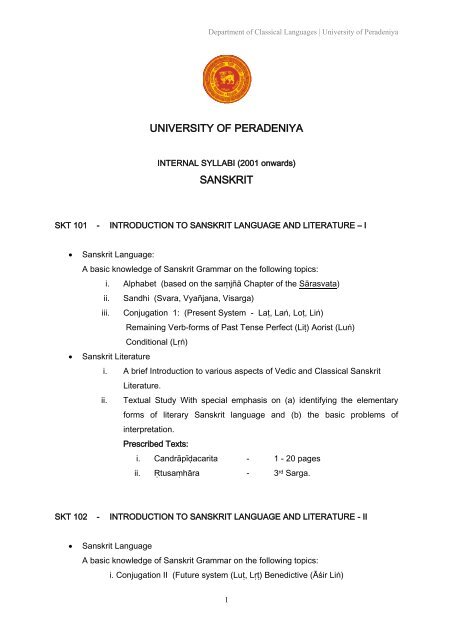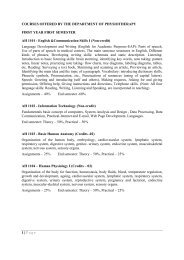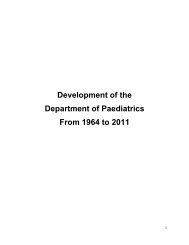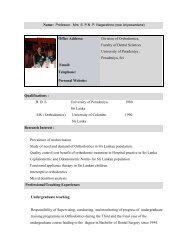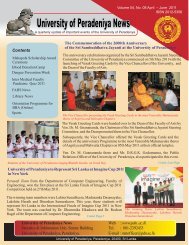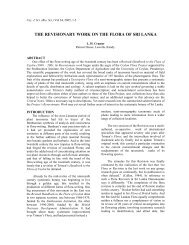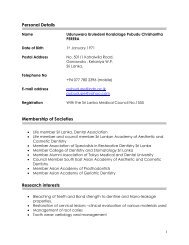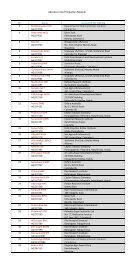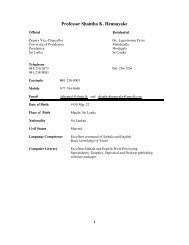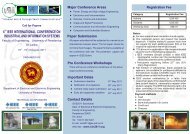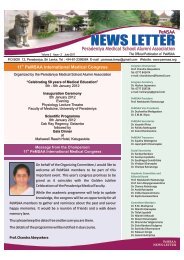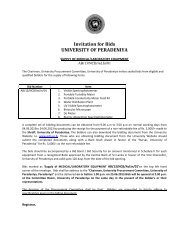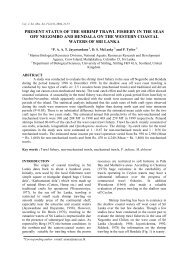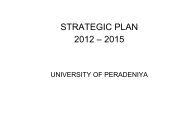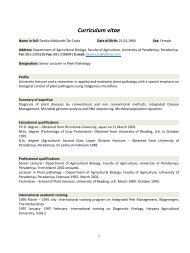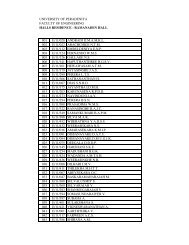Syllabus of Sanskrit - University of Peradeniya
Syllabus of Sanskrit - University of Peradeniya
Syllabus of Sanskrit - University of Peradeniya
You also want an ePaper? Increase the reach of your titles
YUMPU automatically turns print PDFs into web optimized ePapers that Google loves.
Department <strong>of</strong> Classical Languages | <strong>University</strong> <strong>of</strong> <strong>Peradeniya</strong><br />
UNIVERSITY OF PERADENIYA<br />
INTERNAL SYLLABI (2001 onwards)<br />
SANSKRIT<br />
SKT 101 - INTRODUCTION TO SANSKRIT LANGUAGE AND LITERATURE – I<br />
<br />
<br />
<strong>Sanskrit</strong> Language:<br />
A basic knowledge <strong>of</strong> <strong>Sanskrit</strong> Grammar on the following topics:<br />
i. Alphabet (based on the saṃjñā Chapter <strong>of</strong> the Sārasvata)<br />
ii. Sandhi (Svara, Vyañjana, Visarga)<br />
iii. Conjugation 1: (Present System - Laṭ, Laṅ, Loṭ, Liṅ)<br />
Remaining Verb-forms <strong>of</strong> Past Tense Perfect (Liṭ) Aorist (Luṅ)<br />
Conditional (Lṛṅ)<br />
<strong>Sanskrit</strong> Literature<br />
i. A brief Introduction to various aspects <strong>of</strong> Vedic and Classical <strong>Sanskrit</strong><br />
Literature.<br />
ii. Textual Study With special emphasis on (a) identifying the elementary<br />
forms <strong>of</strong> literary <strong>Sanskrit</strong> language and (b) the basic problems <strong>of</strong><br />
interpretation.<br />
Prescribed Texts:<br />
i. Candrāpīḍacarita - 1 - 20 pages<br />
ii. Ṛtusaṃhāra - 3 rd Sarga.<br />
SKT 102 - INTRODUCTION TO SANSKRIT LANGUAGE AND LITERATURE - II<br />
<br />
<strong>Sanskrit</strong> Language<br />
A basic knowledge <strong>of</strong> <strong>Sanskrit</strong> Grammar on the following topics:<br />
i. Conjugation II (Future system (Luṭ, Lṛṭ) Benedictive (Āśir Liṅ)<br />
1
Department <strong>of</strong> Classical Languages | <strong>University</strong> <strong>of</strong> <strong>Peradeniya</strong><br />
<br />
ii. Passive voice<br />
iii. Derivative Verbs (Causative, Intensive,Desiderative)<br />
iv. Infinitives<br />
v. Indeclinables<br />
<strong>Sanskrit</strong> Literature<br />
Textual Study with special emphasis on (a) identifying the elementary forms <strong>of</strong><br />
literary <strong>Sanskrit</strong> language and (b) the basic problems <strong>of</strong> interpretation.<br />
Prescribed Texts:<br />
i. Pañcatantra (Labdhapraṇāśa) - 1 - 5 stories<br />
ii. Nītiśataka<br />
- 1 - 50 verses<br />
SKT 201 - SANSKRIT POETICAL LITERATURE I<br />
This course is a brief survey <strong>of</strong> the tradition <strong>of</strong> <strong>Sanskrit</strong> Metrical composition (kāvya)<br />
from the Vedic age to the middle ages. It lays emphasis on the main poetical works and<br />
their writers, their form and style and the Socio-Cultural background in which these traditions<br />
were born and handed down.<br />
Prescribed Texts:<br />
Buddhacarita - 3 rd Chapter<br />
Kumārasambhava - 4 th Sarga<br />
Meghadūta (Pūrvamegha) - 01 - 30 Verses<br />
Gītagovinda - 1.4<br />
SKT 202 -<br />
SANSKRIT PROSE LITERATURE I<br />
The aim <strong>of</strong> the Course is to examine the history <strong>of</strong> <strong>Sanskrit</strong> prose composition from<br />
the Vedic period onward. It will pay attention to the study <strong>of</strong> both religious and poetical<br />
prose. The texts will be evaluated from religious, literary and aesthetic points <strong>of</strong> view. Both<br />
Brahmanic and Vedic texts will be used.<br />
2
Department <strong>of</strong> Classical Languages | <strong>University</strong> <strong>of</strong> <strong>Peradeniya</strong><br />
Prescribed Texts:<br />
<br />
Selected passages <strong>of</strong> Yajurveda, Brāhmaṇas, Āraṇyakas and Upaniṣads which<br />
are quoted in Böthlink's <strong>Sanskrit</strong> Christomathie<br />
Vedaśāstrasaṃgraha<br />
and Sāhityaratnakoṣa:<br />
Daśakumāracarita (Uttarapīṭhikā) - 7 th Ucchvāsa<br />
Kādambarī (Kathāmukha) - 01 - 10 pages<br />
Harṣacarita (Kale's edition) - 02 -12 pages<br />
SKT 203 -<br />
SANSKRIT GRAMMAR AND UNSPECIFIED TEXTS<br />
This course introduces students to the principles <strong>of</strong> word formation, sentences and<br />
structures <strong>of</strong> grammar through study <strong>of</strong> passages selected from known literary works.<br />
Prescribed Texts:<br />
<br />
Sārasvatavyākaraṇam (Nāmakāṇḍa)<br />
wdOqksl ixialD; jHdlrKh - ta' ta' uelafvdk,aâ<br />
ixialD; YslaIlh m%:u iy oaú;Sh mqia;l - tï' tÉ' t*a' chiQßh<br />
SKT 204 -<br />
DIDACTIC (GNOMIC) LITERATURE IN SANSKRIT<br />
The purpose <strong>of</strong> this course is to introduce students to the vast repository <strong>of</strong> didactic<br />
literature in <strong>Sanskrit</strong>. Sections from classical didactic literature will be analyzed and their<br />
social, ethical and religious significance will be emphasized.<br />
Prescribed Texts:<br />
Hitopadeśa (Sandhi) - 10 kathās<br />
Subhāṣitaratnākara (Durjananindā) - 01 - 50 Verses<br />
SKT 205 -<br />
SANSKRIT POETICAL LITERATURE II<br />
The aim <strong>of</strong> the course is to study the history <strong>of</strong> <strong>Sanskrit</strong> metrical composition from the<br />
middle ages to date. It lays emphasis on the main poetical works and their writers, their form<br />
3
Department <strong>of</strong> Classical Languages | <strong>University</strong> <strong>of</strong> <strong>Peradeniya</strong><br />
and style, and the socio-cultural background in which this tradition was handed down. SKT<br />
201 will be a prerequisite.<br />
Prescribed Texts:<br />
Selected passages from Mahābhārata given in Mahābhārata Pāthāvalī ed. By<br />
M.H.F.Jayasuriya<br />
Rāmāyaṇa (Sundarakāṇḍa) - 13 -14 chapters<br />
Vairāgyaśataka - 01 - 25 Verses<br />
Siśupālavadha (1 st Sarga) - 01 - 30 Verses<br />
SKT 206 -<br />
SANSKRIT PROSE LITERATURE II<br />
The aim <strong>of</strong> the course is to examine the history <strong>of</strong> prose composition from the<br />
classical period to date. Emphasis will be on the language used in <strong>of</strong>ficial and day-to-day<br />
activities. Texts will be evaluated from literary and aesthetic points <strong>of</strong> view. SKT 203 will be a<br />
prerequisite.<br />
Prescribed Texts:<br />
Kathāsaritsāgara - 23 rd Adhyāya, Fourth Lambaka, Third Taraṅga<br />
Girnār Rock Inscription <strong>of</strong> Rudradāman<br />
Jetavanārāma Inscription<br />
A modern <strong>Sanskrit</strong> Fiction also will be included<br />
SKT 207 -<br />
SANSKRIT GRAMMAR AND COMPOSITION<br />
This course <strong>of</strong>fers a comparative study <strong>of</strong> the Vedic and Classical grammar <strong>of</strong><br />
<strong>Sanskrit</strong>. After an initial study <strong>of</strong> these grammars separately, texts in vedic and classical<br />
prose will be compared to highlight the main differences in the two grammatical systems.<br />
Prescribed Texts:<br />
Vedic Grammar for Students - A. A. Macdonell<br />
The <strong>Sanskrit</strong> Language - T. Burrow<br />
An introductory knowledge <strong>of</strong> Yāska , Pāṇini, Pātañjalī and other olden<br />
grammarians<br />
4
Department <strong>of</strong> Classical Languages | <strong>University</strong> <strong>of</strong> <strong>Peradeniya</strong><br />
SKT 208 -<br />
SANSKRIT LITERATURE AS SOURCES OF HISTORY<br />
The primary aim <strong>of</strong> this course is to introduce the historical traditions <strong>of</strong> India, which<br />
varied from mythical and legendary material to social and political material. Information<br />
pertaining to different eras <strong>of</strong> India, in their historical perspective, will be taken up for<br />
analyses.<br />
Prescribed Texts:<br />
Mandasore stone Inscription <strong>of</strong> Kuamāragupta - 01 - 15 Verses<br />
Aihole Stone Inscription <strong>of</strong> Pulakeśin II - 01 - 15 Verses<br />
Rājataraṅgaṇī (1 st Taranga) - 100 - 150 Verses<br />
SKT 301<br />
- SANSKRIT DRAMA I<br />
The aim <strong>of</strong> this course is to study the history <strong>of</strong> <strong>Sanskrit</strong> Drama from its very<br />
beginning up to the time <strong>of</strong> Bhāsa and to analyze <strong>Sanskrit</strong> plays form the Indian rhetoricians'<br />
point <strong>of</strong> view.<br />
Prescribed Texts:<br />
Svapnavāsavadattā <strong>of</strong> Bhāsa - 1 - 5 Acts<br />
Pratijñāyaugandharāyaṇa <strong>of</strong> Bhāsa - 1 - 5 Acts<br />
SKT 302<br />
- POETICS AND LITERARY CRITICISM<br />
This course intends to study the views on poetry, poetic composition and criticism<br />
expressed by the Indian rhetoricians and <strong>of</strong> literary works and authors who were influenced<br />
by those views.<br />
Prescribed Texts:<br />
Kāvyādarśa <strong>of</strong> Daṇḍin - 1 st and 2 nd chapters<br />
Dhavanyāloka <strong>of</strong> Ānandawardhana - 1 st and 2 nd Udyotas<br />
Kāvyālaṅkārasūtra <strong>of</strong> Vāmana - 1 st and 3 rd Adhikaraṇa<br />
Sāhityadarpaṇa <strong>of</strong> Viśvanātha - 3 rd chapter.<br />
5
Department <strong>of</strong> Classical Languages | <strong>University</strong> <strong>of</strong> <strong>Peradeniya</strong><br />
SKT 303<br />
- VEDIC LITERATURE I<br />
The purpose <strong>of</strong> this course is to study the language and the literature <strong>of</strong> the Vedic<br />
Period and the culture depicted in it with special reference to Ṛgveda.<br />
Prescribed Texts:<br />
I.1 Agni<br />
I.154 Viṣṇu<br />
II.12 Indra<br />
III.33 Viśvāmitra nadī saṃvāda<br />
IV.51 Uṣā<br />
V.85 Varuṇa<br />
VII.48 Viśvedevā<br />
VII.63 Viśvedevā<br />
VII.103 Maṇḍūka<br />
X.14 Yama<br />
X.34 Akṣāḥ<br />
X.90 Puruṣa<br />
X.121 Hiraṇyagarbha<br />
X.129 Nāsadīya<br />
SKT 304 - BUDDHIST LITERATURE IN HYBRID SANSKRIT<br />
The course aims at identifying the distinctive features <strong>of</strong> the language (a mixture <strong>of</strong><br />
<strong>Sanskrit</strong> and Prakrit) used in Buddhist <strong>Sanskrit</strong> Literature. It also lays emphasis on concepts<br />
and ideas presented by Mahayana thinkers.<br />
Prescribed Texts:<br />
Mahāvastu (Buddhist <strong>Sanskrit</strong> Texts) - pp. 295 - 305.<br />
edited by Dr. S. Bageht, 1970. Mithila Institute, Darbanga.<br />
Lalitavistara - 18 th chapter (Nairañjanaparivarta)<br />
Saddharmapuṇḍarīkasūtra - 3 rd chapter (Aupamyaparivarta)<br />
SKT 305<br />
- SANSKRIT DRAMA II<br />
This is a continuation <strong>of</strong> SKT 301 which is a pre-requisite. The purpose <strong>of</strong> this<br />
course is to study the history <strong>of</strong> <strong>Sanskrit</strong> Drama from the age <strong>of</strong> Kālidāsa onwards and to<br />
study the dramatical texts belonging to this period.<br />
Prescribed Texts:<br />
Abhijñānaśākuntala <strong>of</strong> Kālidāsa - I, II, III, IV Acts<br />
6
Ratnāvalī <strong>of</strong> Sri Harsa-Deva - I, II Acts<br />
Uttararāmacarita <strong>of</strong> Bhavabhūti - I, II, III Acts<br />
Department <strong>of</strong> Classical Languages | <strong>University</strong> <strong>of</strong> <strong>Peradeniya</strong><br />
SKT 306<br />
- BUDDHIST LITERATURE IN CLASSICAL SANSKRIT<br />
This course is a continuation <strong>of</strong> SKT 304, being a study <strong>of</strong> Buddhist Literature in<br />
Classical <strong>Sanskrit</strong> and a general understanding <strong>of</strong> the content therein. SKT 304 will be a<br />
pre-requisite.<br />
Prescribed Texts:<br />
Jātakamālā <strong>of</strong> Āryaśūra - Śaśa Jātaka<br />
Saundarananda <strong>of</strong> Aśvaghoṣa - 8 th Sarga<br />
Śatapañcāśataka <strong>of</strong> Mātṛcheṭa - 6 – 7 chapters<br />
Mūlamādhyamikakārikā - 24 th chapter<br />
SKT 307<br />
- VEDIC LITERATURE II<br />
This is a continuation <strong>of</strong> SKT 303 being a study <strong>of</strong> the language and literature <strong>of</strong><br />
Vedic Period with special reference to the later Vedas, Brāhmaṇas and Purāṇas. SKT 303<br />
will be a pre-requisite.<br />
Prescribed Texts:<br />
Atharvaveda - I.17, IV.16, IV.25, V.22.<br />
Śatapatha Brāhmaṇa - 1.8.1. (1 – 10)<br />
Aitareya Brāhmaṇa - 7.13 ( Śunaḥśepha 29 – 34)<br />
Viṣṇu Purāṇa - Purūravas Urvasi Upākhyānam<br />
Vāyu Purāṇa - Janakāśvamedhe Yājñavalkyapratiṣṭhā<br />
SKT 308<br />
- HISTORY OF SANSKRIT LITERATURE<br />
7
Department <strong>of</strong> Classical Languages | <strong>University</strong> <strong>of</strong> <strong>Peradeniya</strong><br />
This course <strong>of</strong>fers a study <strong>of</strong> the origin, growth, expansion and decline <strong>of</strong> the <strong>Sanskrit</strong><br />
Literature laying emphasis on consideration <strong>of</strong> extinct and extant literary forms and kinds.<br />
SKT 309 - ELEMENTARY SANSKRIT I<br />
Those who are <strong>of</strong>fering the Special degree in <strong>Sanskrit</strong> will not be permitted to follow<br />
this course, as it has been specially designed to meet the requirements <strong>of</strong> those who do not<br />
have a basic knowledge <strong>of</strong> <strong>Sanskrit</strong>.<br />
Topics<br />
<br />
<br />
<br />
The alphabet<br />
Referring the <strong>Sanskrit</strong> Dictionary for unknown words<br />
Verbs and their conjugation<br />
i. Present tense, Imperfect tense, Perfect tense, Future tense,<br />
Imperative mood, Potential mood, Gerunds (Absolutives) and<br />
Infinitives.<br />
<br />
Nouns and their cases (Declension)<br />
i. Consonant Nouns ending in t\ g\ r\<br />
ii. Masculine Nouns ending in c O p C cf]<br />
iii. Neutral Nouns ending in c O p<br />
iv. Feminine Nouns ending in cf O O{ p C<br />
v. Pronouns c:db\ o'idb\ Obd\<br />
<br />
Sandhi (External Sandhi)<br />
Vowels, consonants and Visarga<br />
A study <strong>of</strong> the language with respect to the above grammatical points<br />
will be made through easy selections from texts such as Bālādarśa, Prathamādarśa,<br />
Abhinavapāthāvalī, Pañcatantra, Hitopadeśa and Candrāpīḍacarita.<br />
SKT 310 -<br />
ELEMANTARY SANSKRIT II<br />
This course is a continuation <strong>of</strong> SKT 309. Those who are <strong>of</strong>fering the Special<br />
degree in <strong>Sanskrit</strong> will not be permitted to follow this course, as it has been specially<br />
designed to meet the requirements <strong>of</strong> those who do not have a basic knowledge <strong>of</strong> <strong>Sanskrit</strong>.<br />
8
Department <strong>of</strong> Classical Languages | <strong>University</strong> <strong>of</strong> <strong>Peradeniya</strong><br />
Topics<br />
Grammar<br />
i. Taddhita<br />
ii. Participles<br />
iii. Causals<br />
iv. Compounds<br />
v. Passive Voice<br />
Textual Studies<br />
A study <strong>of</strong> the language will be made through sections selected from texts such as<br />
Pañcatantra, Hitopadeśa, Candrāpīḍacarita, Rājataraṅgaṇī, Nāṭyaśāstra, Kāvyādarśa,<br />
Dhvanyāloka, Inscriptions, Dramas, Epics, Lyrics, Purāṇas, Prose poems and Buddhist<br />
<strong>Sanskrit</strong> texts.<br />
SKT 401<br />
- VEDĀNGA LITERATURE<br />
The aim <strong>of</strong> this course is to provide a general introduction on origin, growth<br />
and the content <strong>of</strong> Vedāṅga Literature.<br />
Topics<br />
A brief survey <strong>of</strong> the six Vedāṅgas: Śikṣā (Phonetics), Kalpa (Rituals), Nirukti<br />
(Etymology), Chandas (Prosody), Jyotis (Astronomy), Vyākaraṇa (Grammar)<br />
Education system <strong>of</strong> the Vedic period and<br />
Textual study<br />
i. a study <strong>of</strong> selections from Varāhamihira's text on Jyotis - 1 st chapter<br />
ii. Manusmṛti - 7. 1 - 50 stanzas<br />
iii. Vṛttaratnākara - 1, 2 chapters<br />
SKT 402<br />
- PHILOSOPHICAL LITERATURE IN SANSKRIT<br />
9
Department <strong>of</strong> Classical Languages | <strong>University</strong> <strong>of</strong> <strong>Peradeniya</strong><br />
The objective <strong>of</strong> this course is to provide a general introduction on the<br />
philosophical and logical literature in <strong>Sanskrit</strong>.<br />
Topics<br />
Philosophical ideas and concepts in the Vedas, Brāhmaṇas and Buddhist <strong>Sanskrit</strong><br />
works<br />
Textual study<br />
i. Sāṃkhyakārikā <strong>of</strong> Īśvarakṛṣṇa - 1 st chapter (1-25 stanzas)<br />
ii. Pātañjalīyogasūtra - 1 st chapter<br />
iii. Vedāntasāra <strong>of</strong> Sadānanda - 1 st chapter<br />
SKT 403<br />
- HISTORY OF SANSKRIT LANGUAGE<br />
The objective <strong>of</strong> this course is to study the History <strong>of</strong> <strong>Sanskrit</strong> Language.<br />
Topics<br />
Indo European period<br />
Indo-Iranian Period<br />
Principles <strong>of</strong> general phonological change<br />
<strong>Sanskrit</strong> phonological system and its Indo-European origins<br />
Morphological affinity <strong>of</strong> Indo-European and <strong>Sanskrit</strong> Languages<br />
Comparative study <strong>of</strong> Vedic and Classical forms in <strong>Sanskrit</strong> Language<br />
Epic <strong>Sanskrit</strong><br />
Buddhist Hybrid <strong>Sanskrit</strong><br />
Non-Aryan influences on <strong>Sanskrit</strong><br />
<strong>Sanskrit</strong> as a spoken language - its position as a medium <strong>of</strong> mass communication<br />
Nighanḍus, Koṣas, Dictionaries, Encyclopaedias <strong>of</strong> <strong>Sanskrit</strong> Language.<br />
SKT 498<br />
- DISSERTATION I<br />
10
Department <strong>of</strong> Classical Languages | <strong>University</strong> <strong>of</strong> <strong>Peradeniya</strong><br />
The students who are specializing in <strong>Sanskrit</strong> will be required to write a<br />
dissertation on a subject selected by the student and approved by the Department, which<br />
shall in any case fall wholly or partly within one or more <strong>of</strong> the fields <strong>of</strong> <strong>Sanskrit</strong> Study.<br />
SKT 405<br />
- VEDIC CULTURE<br />
The objective <strong>of</strong> this course is to study the various aspects <strong>of</strong> Vedic culture.<br />
Topics<br />
<br />
<br />
<br />
<br />
<br />
<br />
<br />
<br />
The sources <strong>of</strong> Vedic culture<br />
Geographical spread <strong>of</strong> the Vedic India<br />
Ethnic diversification <strong>of</strong> India as reflected in the Vedic texts<br />
Political systems and Institutions in the Vedic age<br />
legal Institutions, social system<br />
Emergence <strong>of</strong> towns and cities<br />
Economy and trade<br />
Religions and cults and rituals and rites.<br />
SKT 406<br />
- SCIENTIFIC AND TECHNOLOGICAL LITERATURE IN SANSKRIT.<br />
This course will introduce students to the scientific and Technological<br />
literature in <strong>Sanskrit</strong> such as Mathematics, Politics, Āyurveda, Astrology, Astronomy and<br />
Kāmaśāstra.<br />
Topics<br />
<br />
<br />
<br />
Tradition <strong>of</strong> Śāstras in <strong>Sanskrit</strong> Literature<br />
Branches <strong>of</strong> science and Technology in the Vedic and Later <strong>Sanskrit</strong> Literature<br />
A short survey on the <strong>Sanskrit</strong> works related to each major branch <strong>of</strong> science and<br />
Technology<br />
<br />
Textual study<br />
i. Kāmaśāstra - 4 th chapter<br />
ii. Arthaśāstra - 6 th chapter<br />
11
Department <strong>of</strong> Classical Languages | <strong>University</strong> <strong>of</strong> <strong>Peradeniya</strong><br />
iii. Suśruta saṃhitā -<br />
iv. Caraka saṃhitā -<br />
SKT 407<br />
- SANSKRIT LITERATURE IN SRI LANKA<br />
The objective <strong>of</strong> this course is to study the <strong>Sanskrit</strong> Literature in Sri Lanka.<br />
Topics<br />
Introduction <strong>of</strong> <strong>Sanskrit</strong> to Sri Lanka - Myth and History<br />
Sri Lankan authors and their <strong>Sanskrit</strong> texts<br />
State, educational and cultural activities <strong>of</strong> Sri Lanka as depicted in Sri Lankan<br />
<strong>Sanskrit</strong> texts<br />
Contributions made by <strong>Sanskrit</strong> traditions to Sri Lankan culture with regard to the<br />
Mahayana Buddhism, Hinduism<br />
Literary traditions such as Mahākāvya tradition and mixed Sinhala, Medicine,<br />
Astrology and Artistic influence<br />
Textual study<br />
i. Jānakīharaṇa - 3 rd canto (30 - 60 verses)<br />
8 th canto (1-20 verses)<br />
ii. <strong>Sanskrit</strong> Inscriptions in Sri Lanka<br />
Tiriyāya inscription<br />
Trikāyastava inscription<br />
SKT 499<br />
- DISSERTATION II<br />
The students who are specializing in <strong>Sanskrit</strong> will be required to write a<br />
dissertation on a subject selected by the student and approved by the Department, which<br />
shall in any case fall wholly or partly within one or more <strong>of</strong> the fields <strong>of</strong> <strong>Sanskrit</strong> Study.<br />
12


